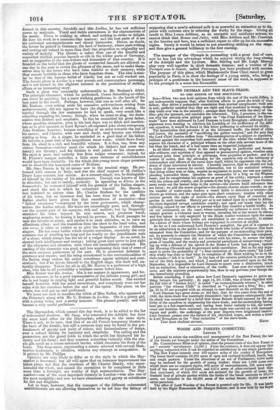LORD DENMAN AND THE SLAVE-TRADE.
TO THE EDITOR OF THE SPECTATOR.
SIR—When two men hold opinions from which the rest of the world differs, it not unftequently happens that, after fruitless efforts to prove the truth of their fallacy, they derive a melancholy consolation from mutual compliment; walk arm in arm, perfectly satisfied that they are right and that mankind is wrong; declare that truth ever was in the minority; assuage their feelings with the story of Ga- lileo; pity the ignorant, and condemn the interested. This, I presume, is the rea- son why the seventy-nine printed pas, on "the Final Extinction of the Slave- trade" have been addressed by Lord Denman to Lord Brougham; although if any argument were wanting to convince his Lordship of the inefficiency of the Afri- can squadron, it would be found in this letter professing to advocate its utility.
The lamentation that pervades it at the increased traffic, the detail of crime and horror, the necessity of "sacrificing the golden vacation," and the pain that the Lord Chief Justice suffers from "the contemplation of a subject so repulsive," militate against the somewhat bold assertion of the title; whilst the endeavour to asperse the character of a principal witness on the other side savours more of the bar than the bench, and of a bad cause than an impartial judgment.
In all blind advocacy, there is the same clinging to particular and favour- able evidence, and rejection of that opposed to preconceived opinion, whether such advocacy arise from principle or patronage, Irons prejudice or pocket; and it is matter of notice, that the advocates for the squadron rely on the testimony of commanders and officers of the naval force itself, whilst its opponents cite the evi- dence of those interested in slavery. I humbly conceive, that we should not look to either of these sources for correct information, but to the statistical returns, that being either true or false, require no argument to prove, nor can any special- pleading contradict them. Question the commander of a brig on the Western coast, and he recapitulates his captures as proof of his utility; reproach a slaver with his crimes and cruelty, and he points to the brig as the cause. Our Govern- ment sends out the fastest brigs in the service—the slavers build schooners that are faster; we add the screw-propeller—the slavers charter steam-vessels; an ex- tra number of water-casks renders a vessel liable to detention or seizure—the slavers go without, and the cargo goes upon short commons; treaties with other nations permit the right of search—the slavers carry flags of countries not parties to such treaties. Slavery per se is not looked upon as a crime in Africa: the most degraded savage condemns cruelty; and upon our heads they lay the suffering, caused by our efforts to prevent what they consider a lawful traffic. In all our settlements on the coast, where naturally our influence is most felt, we cannot prevent a Coloured man or woman investing his or her money in slaves; and free labour is only employed by the Black master workman upon the same principle that temperance hotels are established in our own country, to attract the custom of those whose feelings are repugnant to coercion or alcohol. As far as I can understand Lord Denman's pamphlet, the gist of it appears to be an exhortation to the public to read the three blue books of evidence that have emanated from the Committee; and for the purpose of recommending their peru- sal, he proceeds to censure the Members of which the Committee was composed, to vilify the evidence that did not dovetail with his views, to accuse the daily press of venality, and the weekly and provincial periodicals of subserviency; wind- ing up with a defence of his speech in the House of Lords last August, against the Morning Chronicle and its presumed noble contributor. But as for any argu- ment to prove the probability of "a final extinction of the slave-trade," his Lord- ship wisely has done to that what he complains of Mr. Hutt wishing to do to the slave-trade—" left it to itself." In the face of the returns published in your jour- nal of the 26th August, and which I analyzed and commented upon on the 9th September, it is impossible for Lord Denman to assert even a diminution, much less an extinction, final or otherwise, of the traffic. Last year the exports were more, and the captures proportionably less, than in any previous year except the one immediately preceding.
Before concluding, I must notice how Lord Denman's eagerness to prove no- thing betrays his partiality. In page 14, Dr. Cliffe, who is there dignified with his full title of " Senhor Jose," is called "an unexceptionable witness": in other portions "the witness Cliffe" is described as "a pirate and a felon," arc.; and pp. 25 to 29 are occupied with an attempt to cast discredit on his evidence. Lord Denman lays great stress on the fact, that for two years from the end of 1840, the slave-trade was materially diminished: but it appears subsequently, that its check was occasioned by a belief that Great Britain would succeed by the ac- tivity of the squadron in suppressing the slave-trade; and the undertaking having been put to a fair experiment, and having been found entirely to fail, the barra- coons and factories were reerected; the slave-trade was carried on with increased vigour and profit; the sufferings of the poor Negroes were heightened tenfold; Lord Denman groans over the failure of his cherished hopes, and writes a letter to Lord Brougham on the "final extinction" of the slave-trade.


























 Previous page
Previous page